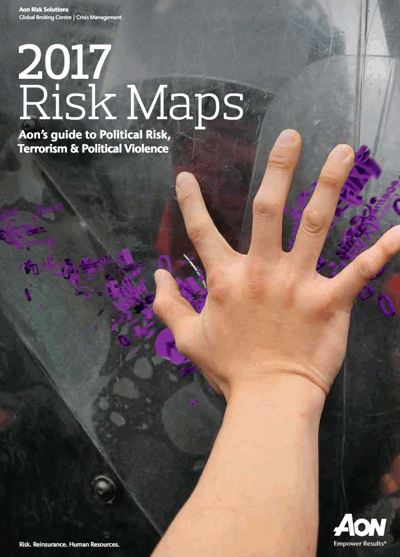Populism and terrorism have been converging, with both elements feeding into and propagating the other to compound global geopolitical risks, said Aon, noting a 14% increase in global terror attacks last year in its latest Risk Maps report.
 This terrorism increase has been compounded by rising waves of populism, which together, create an increasingly uncertain and difficult environment for international business.
This terrorism increase has been compounded by rising waves of populism, which together, create an increasingly uncertain and difficult environment for international business.
Insurance and reinsurance broker Aon commented that the 2017 Risk Maps’ key implications were a warning signal for businesses operating in emerging economies.
“While it is unclear how the populist swing the US and other developed markets will play out, the changing landscape is likely to hit emerging markets hardest and this is why it has never been more important for global businesses to understand their exposures to political risk,” said Aon Political Risk Expert, Sarah Taylor.
The increase in political populism represents a threat to business as it’s expected to create higher levels of trade protectionism.
Figures for global terror attacks last year came to 4,151, representing a significant 14% increase from the previous year, while for Western countries 2016 brought a dramatic hike from 35 up to 96 attacks 174% more than witnessed in 2015.
Terror attacks appear to be largely driven by IS, with the terror group active last year in 29 countries globally compared with 19 in 2015.
Aon highlighted the emerging markets of Brazil, India, Nigeria and Indonesia as being the most resilient to an environment of growing trade protectionism.
In addition to populism and terrorism risks, Aon identified the changing applications of sanctions and declining oil prices as further key factors shaping the 2017 Risks Map.
Taylor said; “The threat posed by sanctions and their changing applications is particularly true of Russia and Iran, and the developments that may create headwinds for energy banks and firms looking to develop operations in those countries.
She added that in addition to terror, populism, and changes to sanctions, the third geopolitical risk identified by Aon analysts is “the impact of changing prices on the energy market, with recent price declines and falling production creating the potential for oil sharks.”
Oil and gas extractor companies are most at risk in the commercial sector – having been the target of 41% of all commercial interests attacks in 2016, and according to Aon’s Risks Map, this trend has continued into this year so far.
The Nigerian oil segment is extremely high-risk, accounting for more than half of total terror attacks within the oil segment globally – Aon warned the most at-risk sectors to carefully consider their exposures and take necessary precautions.
On a national level, terror attack risk levels in Turkey increased last year from high to severe, as potential for conflict in the country grows, while for the UK and USA this has moved up from low to medium.
Despite the rising terror and populism trends, 2017 is the first year in four where as many countries saw a decline in political risk as experienced an increase; showing improvement in economic resilience as nations and businesses learn to cope with the changing geopolitical landscape.


